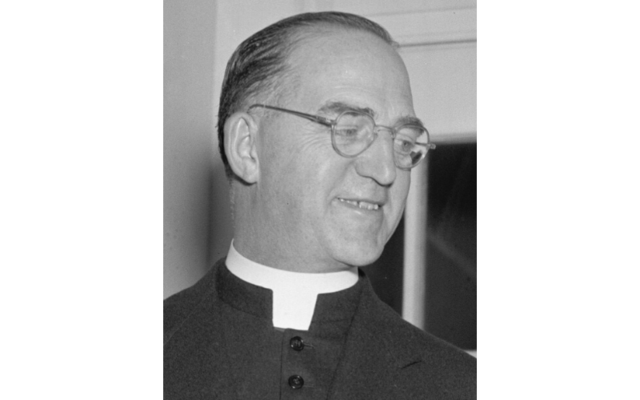In his book, "A New Ireland", Niall O’Dowd traces the first-ever revelation about the savage treatment of children by church and state in Ireland during the 1940s.
“He talked about the Irish institutions as being like concentration camps for children.”
- Tom Lynch, Boys Town Archivist, on Father Flanagan’s view of Irish industrial schools and orphanages.
Those looking for the seeds of what later became the near destruction of the Irish church over child mistreatment and abuse would have found it in the clarion voice of Monsignor Edward Joseph Flanagan—the founder of Boys Town, made famous by the Spencer Tracy movie of the same name, visited Ireland on a specific mission in 1946.
The Irish-born Flanagan, though an international figure and beloved by all for his amazing work, found himself a forlorn voice when he traveled to Ireland to inspect their facilities for treating orphans and needy children.
Flanagan’s connection to Ireland was deep, and he knew what he spoke about. He was born on July 13, 1886, in the townland of Leabeg, County Roscommon, to John, a herdsman, and Honoria Flanagan. In 1904, he immigrated to the United States, entered the priesthood, and in 1917 created Boys Town in Omaha, Nebraska.
The center was open to all. There were no fences to stop the boys from leaving. Fr. Flanagan said he was “not building a prison.”
“This is a home,” he said. “You do not wall in members of your own family.” The 1938 movie Boys Town made a national hero out of Father Flanagan. He was internationally renowned as “the world’s most foremost expert on boys’ training and youth care.”
Flanagan decided to return to the land of his birth in 1946 to visit his family and the “so-called training schools” run by the Christian Brothers to see if they were “a success or failure.”
The success of the film Boys Town meant Flanagan was treated like a celebrity upon his arrival back home. The Irish Independent wrote that Flanagan had succeeded “against overwhelming odds,” spurred on by the simple slogan: “There is no such thing as a bad boy.”
But Flanagan was not home to take a victory lap. According to Flanagan expert Doctor Eoin O’Sullivan of the Department of Social Studies in Trinity College Dublin:
"… The priest had a deep-rooted abhorrence of the institutionalization of children. His unique legacy was that Boys’[sic] Town and the various projects that he initiated were to divert children away from punitive carceral institutions, which he believed damaged children, to self-regulating, empowering, open communities for young people of all creeds and races."
Flanagan had made clear his problems with the incarceration of children, which he believed was a traumatic experience that scarred them for life.

Love Irish history? Share your favorite stories with other history buffs in the IrishCentral History Facebook group.
He wrote to a fellow priest:
“I am particularly interested in the juvenile problem. I would like to get their [Irish welfare department] reaction as to whether these so-called training schools conducted by the Christian Brothers are a success or a failure. My memory—and it is not very clear—is that they have not been very successful in developing individuality, Christian character, and manliness, because they are too much institutionalized. This, as you know, helps the good Brothers and makes it easier for them."
But Flanagan was plunged into despair about what he found in Ireland, especially the Victorian orphanages and reform schools where young offenders were sent. He found them “a scandal, un-Christ-like, and wrong.”
He spoke to a large audience at a public lecture in Cork’s Savoy Cinema and said, “You are the people who permit your children and the children of your communities to go into these institutions of punishment. You can do something about it.”
He called Ireland’s penal institutions “a disgrace to the nation,” and later said, “I do not believe that a child can be reformed by lock and key and bars, or that fear can ever develop a child’s character.” He even attacked the Christian Brothers—the teaching order founded in Ireland to educate the masses and revered as an institution.
Tom Lynch, Boys Town archivist, told the late Mary Raftery, a journalist, who herself did incredible, groundbreaking work on church scandals:
“It was very well known that he was shocked by what he discovered in Ireland.
He talked about the Irish institutions as being like concentration camps for children.”
As Raftery subsequently wrote in the Irish Times in 2004, “[Flanagan] had a profound sense of outrage at how children were treated within these institutions.”
His own words, written in 1947, sum Flanagan’s thoughts on Ireland:
… [U]njust incarceration, unequal distribution of physical punishment both inside and outside the prisons and jails, and the institutionalization of little children, housed in great big factory-like places, where individuality has been and is being, snuffed out with no development of the personality of the individual, and where little children become a great army of child slavery in the workshops, making money for the institutions which give to them a little food, a little clothing, very little recreation, and a doubtful education."
As Raftery noted, it was this view of the institutions that had prompted Father Flanagan to describe them publicly as “a disgrace to the nation,” which received widespread press coverage.
Father Flanagan was also supplied with documentation confirming the savage flogging of a child by Christian Brothers at the industrial school in Glin, Co Limerick. This material was sent by a deeply courageous local representative Martin McGuire, who at the time demanded a public inquiry into the treatment of children in industrial schools.
Gerard Fogarty, the child at the center of the case, died in 2007 at the age of 77. He was flogged by a Christian Brother for escaping from St Joseph’s Industrial School after being committed there for skipping school.
The youngster ran away again the night of the flogging and walked through fields for 32 miles until he returned to his mother in Limerick City.
“By the time I got home, the bleeding on my back had stopped and the blood had dried into my shirt. I must have been a terrible sight. My mother nearly tore the hair out of her head when she saw me.”
As reported by the Alliance Victim Support Group, “The Fogartys along with almost 100 of their neighbors, arrived into Cllr McGuire’s offices at his mill and bakery business on Francis Street.”
The councilor was so shocked by the boy’s injuries that he wrote a letter to the Minister for Education just two days later in which he stated that it was his “distasteful duty to draw your attention to what I consider is a matter of paramount public importance.” He demanded to know if such a form of punishment was “prescribed by law.”
The councilor was relentless in his demands for a public inquiry into industrial schools and Borstal institutions. He hit a brick wall.
The Christian Brother was quietly transferred and McGuire was publicly denounced.
Father Flanagan detested the same Christian Brothers; the organization that educated almost every young male in Ireland. He compared them to Nazis.
In 1947, he wrote in private correspondence:
"[We] have no Christian Brotherhood here at Boys Town. We did have them for five years, but they left after they found out that they could not punish the children and kick them around [ We have punished the Nazis for their sins against society. We have punished the Fascists for the same reason. I wonder what God’s judgment will be with reference to those who hold the deposit of faith and who fail in their God-given stewardship of little children?"
The reaction to Flanagan from the powerful leaders of the theocratic state was as expected. Despite Flanagan’s profile and the worldwide respect for his work, his words were utterly ignored. He was vilified and asked how dare he cast doubt on Ireland’s leaders—both of church and state—who were fine upstanding men (and they were all men). They batted away Flanagan’s broadside.
The reaction in political Ireland was especially bilious. The then-Minister for Justice Gerald Boland said in the Dáil (Ireland’s parliament) that he was “not disposed to take any notice of what Monsignor Flanagan said while he was in this country because his statements were so exaggerated.”
Flanagan struck back, but It would be over 50 years before his words were borne out.
He wrote an open letter:
"What you need over there is to have someone shake you loose from your smugness and satisfaction and set an example by punishing those who are guilty of cruelty, ignorance, and neglect of their duties in high places … I wonder what God’s judgment will be with reference to those who hold the deposit of faith and who fail in their God-given stewardship of little children.”
That judgment day was indeed coming. One could only imagine from his perch in Valhalla what Flanagan’s reaction would have been as the scandals rolled by like tumbleweeds in a gale.
“Told you so” would surely have been on the tip of his tongue. But not even he could have imagined the incredible scale and mountainous waves of change that would come rolling in, transforming his native country from a theocracy to one of the most liberal thinking in the western world.
Niall O'Dowd's "A New Ireland: How Europe's Most Conservative Country Became Its Most Liberal" is now available on Amazon.
* Originally published in Feb 2020, updated in 2022.




Comments